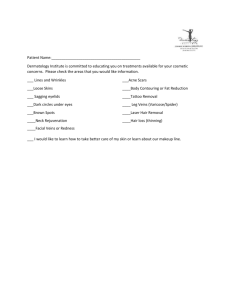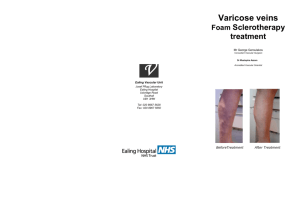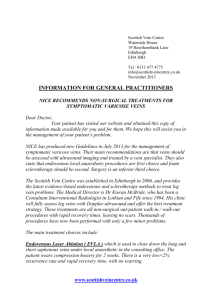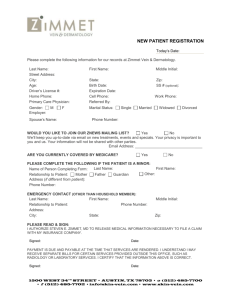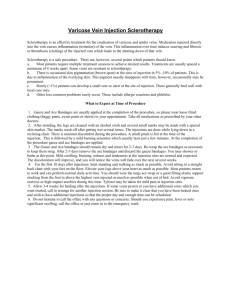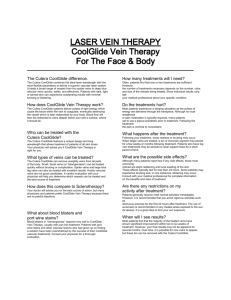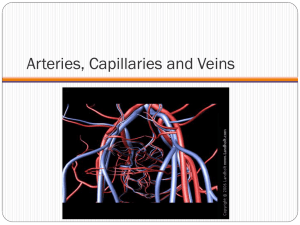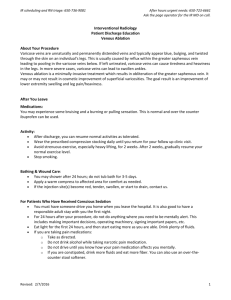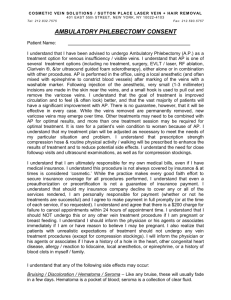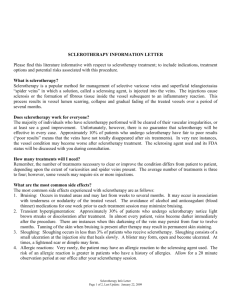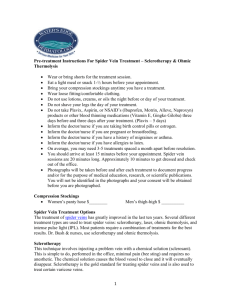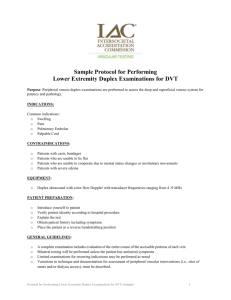Consent form for Venefit RFA, Microphlebectomy, & Sclerotherapy
advertisement
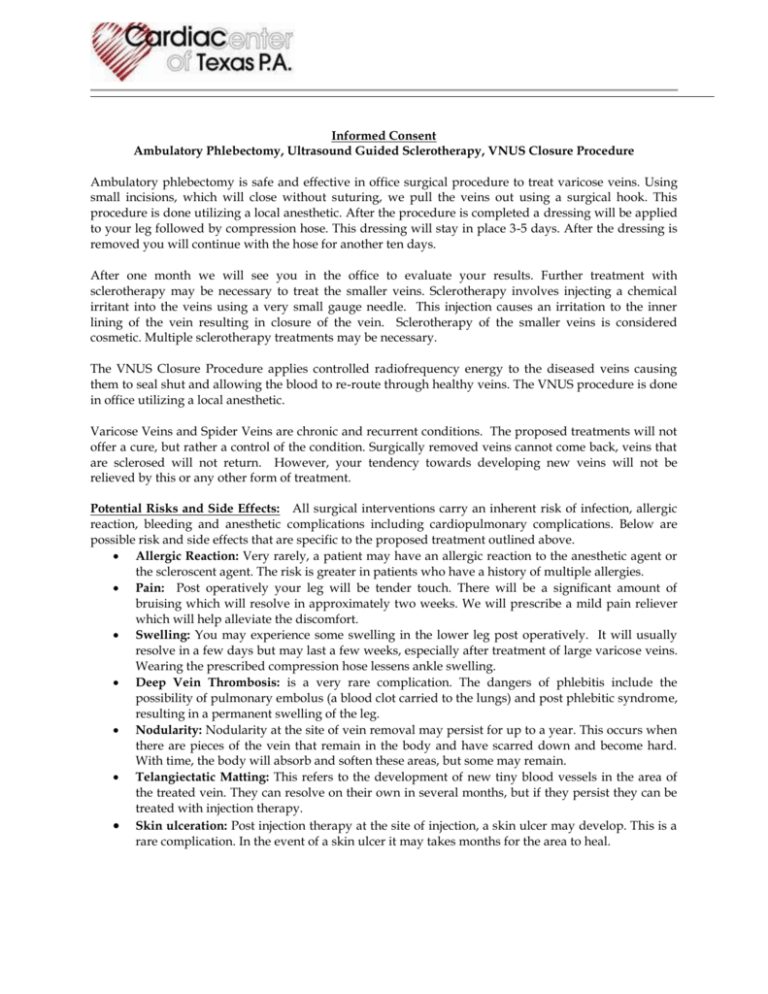
Informed Consent Ambulatory Phlebectomy, Ultrasound Guided Sclerotherapy, VNUS Closure Procedure Ambulatory phlebectomy is safe and effective in office surgical procedure to treat varicose veins. Using small incisions, which will close without suturing, we pull the veins out using a surgical hook. This procedure is done utilizing a local anesthetic. After the procedure is completed a dressing will be applied to your leg followed by compression hose. This dressing will stay in place 3-5 days. After the dressing is removed you will continue with the hose for another ten days. After one month we will see you in the office to evaluate your results. Further treatment with sclerotherapy may be necessary to treat the smaller veins. Sclerotherapy involves injecting a chemical irritant into the veins using a very small gauge needle. This injection causes an irritation to the inner lining of the vein resulting in closure of the vein. Sclerotherapy of the smaller veins is considered cosmetic. Multiple sclerotherapy treatments may be necessary. The VNUS Closure Procedure applies controlled radiofrequency energy to the diseased veins causing them to seal shut and allowing the blood to re-route through healthy veins. The VNUS procedure is done in office utilizing a local anesthetic. Varicose Veins and Spider Veins are chronic and recurrent conditions. The proposed treatments will not offer a cure, but rather a control of the condition. Surgically removed veins cannot come back, veins that are sclerosed will not return. However, your tendency towards developing new veins will not be relieved by this or any other form of treatment. Potential Risks and Side Effects: All surgical interventions carry an inherent risk of infection, allergic reaction, bleeding and anesthetic complications including cardiopulmonary complications. Below are possible risk and side effects that are specific to the proposed treatment outlined above. Allergic Reaction: Very rarely, a patient may have an allergic reaction to the anesthetic agent or the scleroscent agent. The risk is greater in patients who have a history of multiple allergies. Pain: Post operatively your leg will be tender touch. There will be a significant amount of bruising which will resolve in approximately two weeks. We will prescribe a mild pain reliever which will help alleviate the discomfort. Swelling: You may experience some swelling in the lower leg post operatively. It will usually resolve in a few days but may last a few weeks, especially after treatment of large varicose veins. Wearing the prescribed compression hose lessens ankle swelling. Deep Vein Thrombosis: is a very rare complication. The dangers of phlebitis include the possibility of pulmonary embolus (a blood clot carried to the lungs) and post phlebitic syndrome, resulting in a permanent swelling of the leg. Nodularity: Nodularity at the site of vein removal may persist for up to a year. This occurs when there are pieces of the vein that remain in the body and have scarred down and become hard. With time, the body will absorb and soften these areas, but some may remain. Telangiectatic Matting: This refers to the development of new tiny blood vessels in the area of the treated vein. They can resolve on their own in several months, but if they persist they can be treated with injection therapy. Skin ulceration: Post injection therapy at the site of injection, a skin ulcer may develop. This is a rare complication. In the event of a skin ulcer it may takes months for the area to heal. Page 2 Phlebectomy, Sclerotherapy, and VNUS Closure Procedure Consent Hyperpigmentation: Post operatively there may be some darkened areas where blood has leaked into the tissues. This will resolve on its own as the body reabsorbs the blood. In rare cases this darkening of the skin may persist up to a year. Post injection therapy, there may be some trapped blood in the vein that has been closed. This trapped blood may give a discolored appearance to the skin. In some instances it may be necessary to express the trapped blood which will help alleviate the discoloration. Nerve trauma: Occasionally there can be trauma to surrounding nerves, which can result in a transient numbness that will resolve on its own with time. In rare instances the localized numbness may be permanent. Reoccurrences of new veins: When a patient has varicose veins it is usually an ongoing problem. Several years after the vein has been treated the body will attempt to repair itself by taking veins that were insignificant and make them significant. We recommend a yearly follow up with ultrasound so that we can detect any new problems and treat them accordingly as they arise. Alternative Treatments: Because varicose veins and spider veins are not life-threatening conditions, surgical treatment is not mandatory in every patient. Some patients get adequate relief of symptoms from wearing graduated support stockings. Surgical stripping may also be used to treat large varicose veins. This usually requires a hospital stay and usually is performed while the patient is under general anesthesia. Risks of vein stripping are similar with the additional risk of the general anesthetic. The other option is to receive no treatment at all. Informed Consent: By signing below, I acknowledge that I have read the foregoing information and understand the risks and possible side effects, alternative methods of treatment and I hereby consent to the treatment proposed. I consent to the local anesthesia to be administered. I am aware that risks are involved with the administration of local anesthesia such as allergic or toxic reactions to the anesthetic and cardiac arrest. I know the practice of medicine and surgery is not an exact science, and therefore, reputable practitioners cannot guarantee results. While the overwhelming numbers of patients have noted gratifying symptomatic and cosmetic improvement, we cannot promise or guarantee any specific result. Patient Signature Date Physicians Signature: Date: Witness Signature: Date:
